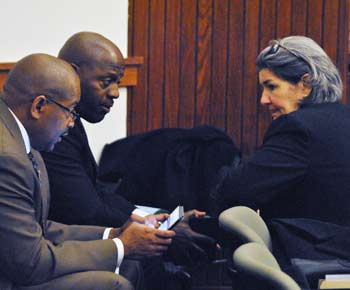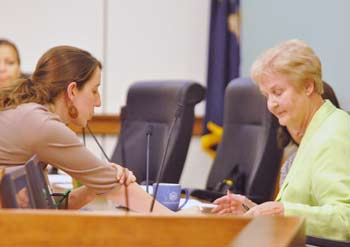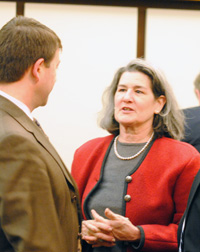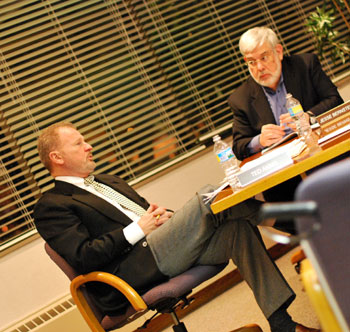County Crafts Pro-Union Labor Strategy
Washtenaw County board of commissioners meeting (Feb. 6, 2013): In an evening capped by a nearly three-hour closed session to discuss labor negotiation strategies, a majority of county commissioners affirmed their support of union labor and pushed back against the state’s recent right-to-work legislation, which takes effect in March.

From left: Greg Dill, Washtenaw County sheriff Jerry Clayton, and Washtenaw County treasurer Catherine McClary. (Photos by the writer.)
On a 6-1 vote – over dissent by Republican Dan Smith – the county board passed a resolution directing the administration to negotiate new four-year contracts “to protect and extend each bargaining unit’s union security provisions.” The resolution also directs negotiations for a separate letter of understanding to cover a 10-year period. The letter would relate to agency fees paid by non-union members based on the idea that they benefit from the union’s representation of their interests during collective bargaining.
Unions represent 85% of the 1,321 employees in Washtenaw County government.
The resolution was brought forward by Andy LaBarre (D-District 7), one of three Ann Arbor commissioners on the nine-member board. Two commissioners – Ronnie Peterson (D-District 6) and Alicia Ping (R-District 3) – were absent.
Deliberations were relatively brief. Dan Smith, who said he found some of the language in the resolution offensive, also pressed for estimates on possible legal expenses, if the county is sued over these new labor agreements. Curtis Hedger, the county’s corporation counsel, was reluctant to speculate, indicating there are still too many unknowns. Diane Heidt, the county’s human resources and labor relations director, told commissioners that the 10-year letter of understanding would have a strong indemnification clause. The union would indemnify the employer for any legal challenges relative to the right-to-work agency shop issue.
The lengthy closed session at the end of the meeting reflected some urgency in negotiations, which must be completed before the new law takes effect in March.
Also at the Feb. 6 meeting, commissioners gave initial authorization to county treasurer Catherine McClary to borrow up to $40 million against the amount of delinquent property taxes in all of the county’s 80 taxing jurisdictions. It’s a standard practice to help the local jurisdictions manage their cash flow. The estimated amount of delinquent taxes is lower than in recent years, possibly reflecting a recovering economy.
McClary also gave the board a year-end report for 2012. Her office brought in $9.96 million during the year from the following sources: delinquent taxes and fees ($5.046 million), accommodation tax ($4.067 million), investment earnings ($755,681), dog licenses ($59,748) and tax searches ($31,760). McClary reported that the county’s investment portfolio totaled $156.08 million at the end of 2012. The non-cash portion of that amount is $147.855 million, which brought in an average weighted yield of 0.456%.
In other action, the board voted to amend an interlocal agreement that will create the Southeast Michigan Regional Energy Office Community Alliance. The new alliance – affiliated with the Michigan Suburbs Alliance, led by county commissioner Conan Smith – is being formed to set up a Property Assessed Clean Energy (PACE) program. The community alliance includes six partners: Washtenaw County, and the cities of Lathrup Village (in Oakland County); Sterling Heights and Roseville (in Macomb County); and Lincoln Park and Southgate (in Wayne County). No other communities in Washtenaw County are part of this alliance. The city of Ann Arbor has already set up its own PACE program.
Also during the Feb. 6 meeting, Yousef Rabhi (D-District 8) reported that he was working with community members and human services providers to establish a Washtenaw County ID card. It would provide a way for residents who don’t have a driver’s license or other photo ID to access services that require such an identification card, such as opening a bank account.
Felicia Brabec reported from the Sustainable Revenue for Supportive Housing Services Task Force, on which she serves. The group is looking at the possibility of an endowment campaign. It’s estimated that about $17 million would be needed “so it’s a big undertaking for us,” she said. That amount would support an additional 116 units of supportive housing throughout the county. [Full Story]






